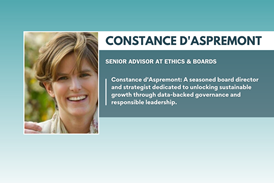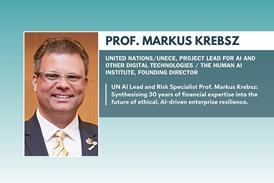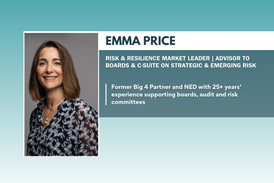ESG and ethical investing are not the same thing. Instead, ESG is a particular investment strategy designed to make profit — is that right?

ESG is good business; it is not necessarily ethical business, or so goes a narrative. Take as an example the words of Paul Clements-Hunt. Mr Hunt describes himself as a “card-carrying capitalist.” Not for him tree-hugging ideas of utopia in which business leaders, staff and suppliers sit around a campfire singing songs and agreeing that making money is the kind of thing only ‘bad people’ do. But belief in capitalism isn’t what makes Paul Clements-Hunt famous. Oh no. Instead, he is the man who, while working for the United Nations, came up with the acronym ESG.
But subtly enters the story. When Mr Hunt was at the UN, he ran the United Nations Environment Programme Finance Initiative, and his focus was to find ways to push investors into backing businesses or schemes designed to reduce income inequality or environmental degradation.
So there is nuance here. ESG investing is, we are told, a way of investing designed to generate profits by reducing the risk associated with environmental, social, and governance issues.
The confusion is revealed. People who care about ethics often care about the environment, social issues, and the governance required to ensure an organisation adheres to applying specific ethical standards. And it turns out some investors, whose prime focus is to make money whilst minimising risk, think getting environmental, social, and governance right helps achieve that.
→ SEE ALSO: Is ESG really ethical?
Motivation behind doing what is right
Maybe it is the difference between giving money to the poor because you want to help the poor and giving them money because you worry that if you don’t, they will rise up and take your money anyway.
It is similar to the Keynesian idea that in a recession, a prudent economic policy is to tax the rich and give to the poor. The policy was not recommended by the economist John Maynard Keynes because he was a socialist, because Keynes, just like Paul Clements-Hunt, was a card-carrying capitalist who incidentally was one of the most successful investors of his time. Instead, Keynes believed that poorer people tend to save less as a proportion of their income and spend more. Keynes was not necessarily pro-taxing the rich all the time, just when economic conditions were such that aggregate demand needed stimulating.
So there’s the pitchforks psychology behind wanting to reduce poverty (worried about social unrest), there is the Keynesian psychology behind reducing inequality (worried about the economy), and there is the altruistic psychology behind reducing poverty (just worried about the poor).
Of course, it is extremely hard to separate those different psychologies in practice. And often, you hear all three arguments made by the same person.
ESG and ethics
And this is partly where the confusion lies. ESG sees profit in doing the kind of things that people who care about ethics also think you should do.
But people whose primary motivation is ethics believe there are lots of things you should do, and not all of them fall within the ESG remit.
I spoke to Dana Hanby from ESG Nexus about this very issue.
She said: “The key objective of ESG integration is to improve the risk-return characteristic of a portfolio. A key objective of Ethical Investing is to trigger change specifically in the Social and Environmental areas.”
In that case, can ESG lead to unethical outcomes?
Dana Hanby said: “Only if the strategy is badly executed – but then we are not really talking about ESG integration either.”
She added: “There are some areas of concern though, that are not yet properly considered, but I try to remain optimistic and hope that the pressure from investors and regulators, who increasingly are looking at the entire value creation chain, will be enough to address these issues.”
Grey area and authenticity
Paul Clements-Hunt is scathing about companies or fund managers who use ESG as a PR tool.
He said: “Anybody who uses ESG, sustainability or green purely as a marketing device is really heading for trouble” in an interview with Bloomberg.
He added: “It’s a whirligig, a frenzy, a marketing mania.”
And that takes us to authenticity. A company is not truly ESG friendly if it doesn’t believe in it. Or, to put it another way, if its shareholders, directors, managers and staff believe in it, if ESG thinking is entwined into a company, then it is authentic.
But you show me someone who cares about the environment and cares about inequality and cares about the well-being of staff in an organisation and working for organisations in the supply chain, and I’ll show you someone who cares about ethics, card-carrying capitalist or not.
ESG World Forum
Part of the Digital Trust Europe Series
ESG World Forum is a two-day, in-person event taking place as part of the Digital Trust Europe series. 2021 was widely considered “the year of ESG investing.” Given the importance society has placed on ESG issues following COP26, we are likely to see this growth trend continue throughout 2022.
ESG World Forum will bring together a range of leading ESG experts and executive speakers from a range of industries as every major company is considering ESG strategies.
FIND OUT MORE ABOUT ESG WORLD FORUM












No comments yet